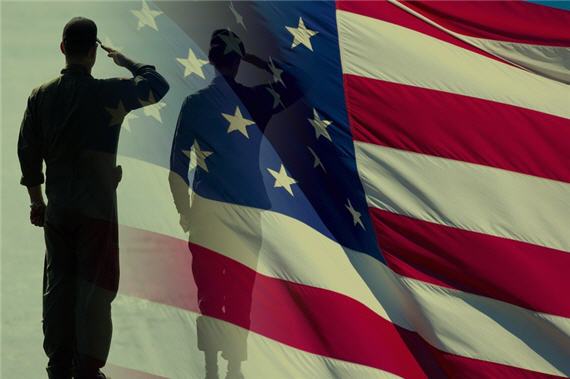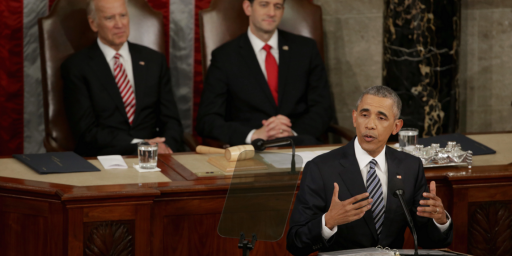The American Public Is Not SEAL Team Six
Last night's State Of The Union Address contained another unfortunate example of the prevalence of militaristic rhetoric in domestic politics.
One of the most powerful moments of President Obama’s speech last night came when President Obama evoked the memory of SEAL Team Six, the unit that hunted down Osama bin Laden and, as we learned this morning, rescued two civilians from Somali pirates at nearly the same time that official Washington was gathering in the Capitol Building for the President’s speech. It framed both the beginning and the end of the speech, actually. Unusually for a State Of The Union, the President started with foreign policy:
We gather tonight knowing that this generation of heroes has made the United States safer and more respected around the world. (Applause.) For the first time in nine years, there are no Americans fighting in Iraq. (Applause.) For the first time in two decades, Osama bin Laden is not a threat to this country. (Applause.) Most of al Qaeda’s top lieutenants have been defeated. The Taliban’s momentum has been broken, and some troops in Afghanistan have begun to come home.
These achievements are a testament to the courage, selflessness and teamwork of America’s Armed Forces. At a time when too many of our institutions have let us down, they exceed all expectations. They’re not consumed with personal ambition. They don’t obsess over their differences. They focus on the mission at hand. They work together.
Imagine what we could accomplish if we followed their example.
And then, at the close of the speech more than an hour later, Obama said:
Which brings me back to where I began. Those of us who’ve been sent here to serve can learn a thing or two from the service of our troops. When you put on that uniform, it doesn’t matter if you’re black or white; Asian, Latino, Native American; conservative, liberal; rich, poor; gay, straight. When you’re marching into battle, you look out for the person next to you, or the mission fails. When you’re in the thick of the fight, you rise or fall as one unit, serving one nation, leaving no one behind.
One of my proudest possessions is the flag that the SEAL Team took with them on the mission to get bin Laden. On it are each of their names. Some may be Democrats. Some may be Republicans. But that doesn’t matter. Just like it didn’t matter that day in the Situation Room, when I sat next to Bob Gates — a man who was George Bush’s defense secretary — and Hillary Clinton — a woman who ran against me for president.
All that mattered that day was the mission. No one thought about politics. No one thought about themselves. One of the young men involved in the raid later told me that he didn’t deserve credit for the mission. It only succeeded, he said, because every single member of that unit did their job — the pilot who landed the helicopter that spun out of control; the translator who kept others from entering the compound; the troops who separated the women and children from the fight; the SEALs who charged up the stairs. More than that, the mission only succeeded because every member of that unit trusted each other — because you can’t charge up those stairs, into darkness and danger, unless you know that there’s somebody behind you, watching your back.
So it is with America. Each time I look at that flag, I’m reminded that our destiny is stitched together like those 50 stars and those 13 stripes. No one built this country on their own. This nation is great because we built it together. This nation is great because we worked as a team. This nation is great because we get each other’s backs. And if we hold fast to that truth, in this moment of trial, there is no challenge too great; no mission too hard. As long as we are joined in common purpose, as long as we maintain our common resolve, our journey moves forward, and our future is hopeful, and the state of our Union will always be strong.
As James Joyner noted in his SOTU Post Mortem this morning, this is fine rhetoric and great speechcraft but it’s unclear what it actually means in the real world. At some point in their Presidency, every President has made this kind of an appeal to national unity and called on Americans to put aside partisanship for one purpose or another. Then, they fly out of Washington the next day giving a serious of stump speeches to sell their SOTU message during which they take as many shots at the opposition as they can. Obama is doing that himself starting today with a speech in Iowa that starts off a three-day, five state (all of them swing states of course) tour of the country to sell his message. This is not to mention the fact that it is more than a little amusing to kick off a Presidential election year with a speech that derides partisanship. Good luck with that one, Mr. President.
More broadly, though, Max Boot expresses concern over the use of analogies to military service in arguments about domestic politics as well as the President’s Tom Brokaw-like nostalgia for the post World War II era in American history:
[N]ostalgia should not mask the fact that the “Mad Men” world is not one most of us would like to live in today. It was, after all, a world where big institutions-whether big government, big media, big business or big unions-had far more power than they do today. The downside of this arrangement was captured in numerous contemporary critiques such as “The Man in the Grey Flannel Suit” and “The Organization Man” and “The Lonely Crowd” that were a touchstone for Baby Boomers rebelling against the conformism of the 1950s.
From our standpoint today, there are some good aspects of the 1950s-the hard work, the sense of common purpose-but also much that we would reject, especially the pervasive racism, anti-Semitism, sexism, homophobia, and other social attitudes-not to mention the pervasive drinking, smoking, and other bad habits. America today is far more individualistic and far more meritocratic with far less tolerance for rank prejudice and far less willingness to blindly follow the orders of rigid bureaucracies.
(…)
Make no mistake: the military works well. But that’s because it’s comprised of volunteers with a mission-defending America. Members of the armed forces are willing to accept privations and hardships, and respond unquestioningly to orders, in a way that civilians will not and should not. Let’s temper our admiration of the military: For all its virtues, it is not a model for the rest of society.
Boot’s first point is self-evident I think. Notwithstanding the praise that the World War II generation has deservedly received thanks largely in part to Tom Brokaw’s books, it’s worth remembering that the 1950s weren’t necessarily the nirvana that they are sometimes portrayed as, especially if you were a member of a minority group. It was odd to hear a Democratic invoking this kind of nostalgia only because it’s usually something you expect to hear from a socially conservative Republican who bemoans the breakdown in “the family” that has supposedly occurred since the halcyon days of Leave It To Beaver. In either case, though, it’s a rather myopic view of the era that papers over the many flaws that Boot points out. In most ways that matter, America is a better place than it was in the 1950s, and that’s partly because we don’t have the kind of mindless “unity” that a culture of conformity creates.
It’s Boot’s second point, though, that I think is most important. Barack Obama isn’t the first President to invoke the qualities that we all admire about the military, the qualities that allow it to get its job done, and argue that the civilian population should emulate it in some respects. For one thing, in the military orders are strictly followed and dissent is unheard of, is this really a model we want for society? Well, maybe if you’re a politician in Washington frustrated by the fact that the messiness of domestic politics makes it difficult to get your agenda enacted you might see the advantages in that, but it’s hardly the kind of society a free individual should want to live in. It would be much more convenient if dissent would just be quiet and everyone would just “work together” to achieve all those important “national objectives, ” wouldn’t it? Perhaps, but that’s not the kind of political system we have, nor is it one we should aspire to.
Of course, much of this is just flowery rhetoric, just as the vast majority of any State Of The Union Address is largely flowery rhetoric. Perhaps it shouldn’t be taken quite as seriously as Boot does. Nonetheless, as I’ve noted before, the prevalence of militaristic rhetoric in American politics is something that helps reenforces the imperialistic view of the Presidency that has come to dominate American politics, and that alone is reason to be concerned about it.







I can only say are you serious Doug. Since it’s not uncommon to invoke military metaphors when marketing cheerios or paper towels I suspect the chances of seeing a reduction of militaro speak in the public arena are slight to none existent. The mention of Boot also evokes a hoot since this guy never ceases to promote the nationally bracing properties of military adventurism. He’d do the world a service if he’d seek a new career in the paper towel business!
Wait, conservatives are now trashing the 1950s? So, when exactly was the era of good times before the liberals ruined everything?
The 1940s? No, that was FDR?
1930s? No, that was The Great Depression.
The Roaring 20s? No, that was jazz, gin joints and flappers.
1910s? No, that was WWI and the Sherman Anti-Trust Act.
The 1900s? I hardly think the era of Teddy Roosevelt appeals to modern conservatives.
The Gay 90s? While they may long for the Gilded Age in fact, that’s not something right wingers talk about in public.
the 1880s? Well, it was the Second Industrial Revolution, the American Indian wars and lynchings were common in the South. I guess that must be it.
21st century conservatism. Taking America Back…to the 1880s.
Mike
It was pretty clear in his speech which attributes of a military team Obama was talking about…reading ideas of quelling dissent into it is just ridiculous.
Its called an analogy, Doug. By definition, that means that one is focusing on a single, or a small set of qualities that are shared between the subject and the phenomenon being analogized. If one wished to equate the two – to claim that they are the same in all regards, then that is what one does. It would be an entirely different argument.
Obama made no effort to claim that ALL the factors at play in the 1940s are to be admired. Nor did he claim that the American people should act in all ways like members of the military force that he could then command to do what he wished them to do. He made it abundantly clear that one particular quality was what he was focusing on – the sense of a commitment to something larger than ones own interest, or ones own partisan interest – namely a commitment to the welfare of the nation.
It is one of the cheapest and most tendentious of arguments to willfully misinterpret an analogy and pretend that other factors, those that are clearly not being analogized, are in fact what the speaker had in mind. Or even if he did not have them in mind, their mere existence somehow undermines the validity of the analogy. That is a nonsense argument, and both James and you are guilty of it on this matter.
There is no reason to believe that if one were to exhibit more of a commitment to the common good, as our fathers and grandfather’s generation did, that one must also accept racism, sexism, and all the other nasty bits that were prevalent at that time.
But seeing how you brought up the Navy…
It’s pretty damn funny that while Romney is making up crap about Obama ruining the Navy…the very same Navy Seal Team that took out OBL was rescuing civilians from Somolian Pirates. It seems to me that Obama is making excellent f’ing use of that which he is simultaneously destroying.
And too…
That Seal Team must be one bad-assed bunch of guys and…I presume…girls. I mean bad-assed even for Seals.
@Hey Norm: Women are not allowed to become SEALs. Sorry to crush your dream.
Cmon Doug, we’re over 21 here. What you’re really upset about is the rather skilful use Obama made of the military ethos as a metaphor for a national need to put differences aside and focus on what’s important.
@ Septimius…
My dream of gender equity? I would expect nothing different from you.
Good Lord, this is almost literally the “If Obama says the sky is blue, I’ll insist it’s green” point of view from the right wing of our political madness.
At least, if you want to articulate this point, then pick Sullivan, who noted that it’s a “bit creepy” to have all the military rhetoric bandied about.
And on that point I kinda, sorta agree, though not anywhere near the extent that’s being made out.
But for MAX BOOT for heavens sake, a guy who is unapologetic paleocon warmonger to beat up Obama about this, of all things is a joke.
The guy advocates a world-wide military presence, nation building and the support of American hegemony through military action.
For him to complain about Obama’s taking the military theme too far – I’d say it’s unbelievable -except for the utter ridiculousness of the over the top hatred of Obama by the right, that makes comments like this possible.
@Hey Norm: Hey, don’t blame me. President Obama was the one praising the sexist and mysoginistic Navy SEALs. I was just trying to correct your error.
Brummagem Joe,
“What you’re really upset about is the rather skilful use Obama made of the military ethos as a metaphor for a national need to put differences aside and focus on what’s important.”
Actually, I suspect that Doug is most upset at the suggestion that we should all pull together behind the government for any purpose. It’s the antithesis of his Randian utopian philosophy.
@Tom Meloth: Max Boot is not a paleocon. Paleocon refers to conservatives that generally oppose military intervention and support isolationism. Neocon refers to conservatives who generally support military intervention and democracy building.
@Septimius:
You are right, my bad- I meant neo and typed paleo!
@ Moosebreath…
Of course Ayn Rand loved the Government once she got sick and needed Medicare.
I loved the speech last night and the analogy. He is hitting where he should. Republicans have kept this country from going forward and have put down or down played everything the president proposed to move forward. He just pointed out last night how we are all Americans and we need to work together to make our country great again. We are not enemies or children we need to work together.
It is hardly surprising that a libertarian would get his feathers ruffled by this…
Your point is asinine. The president used a great metaphor to illustrate how se should all work together cooperatively as Americans. It’s great that you provide analysis and different prospectives into the news, but just posting something that is not that intellectual at all is pointless.
Time to corner the market on
NOT SEAL TEAM 6
T-shirts